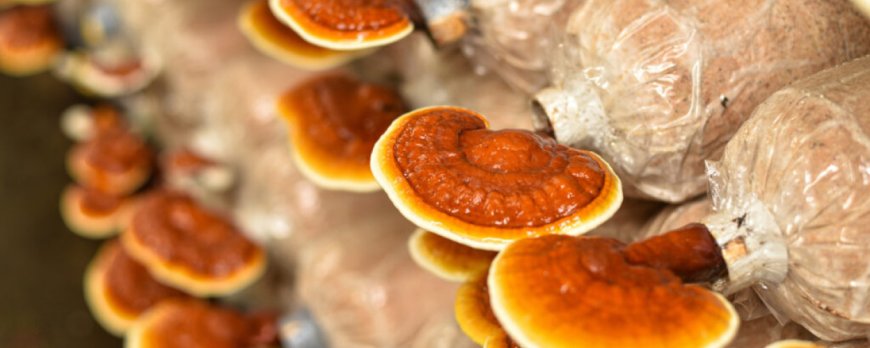Which mushroom is best for gut health?
Explore the answer to 'Which mushroom is best for gut health?', to boost your digestive health with the power of medicinal fungi.

Which Mushroom is Best for Gut Health?
Gut health is essential for overall well-being, and certain mushrooms have properties that can support digestive health. These gut-friendly mushrooms may help enhance gut immunity, promote digestive balance, and balance gut inflammation. Incorporating these mushrooms into your diet or as supplements may promote digestive well-being, but it is essential to consult with a healthcare professional before making any significant changes to your diet or supplement routine.
Key Takeaways
- Gut health is crucial for overall well-being.
- Certain mushrooms have unique properties that can support digestive health.
- Incorporating gut-friendly mushrooms into your diet may promote digestive well-being.
- Consult with a healthcare professional before making any significant changes to your diet or supplement routine.
Understanding the Importance of Gut Health
Gut health plays a significant role in our overall well-being. The gut microbiome, a complex community of microorganisms that live in our digestive system, is responsible for several essential functions. It aids in nutrient absorption, immune system regulation, and even influences our mood and behavior. Therefore, maintaining a healthy gut is crucial for optimal physical and mental health.
Several factors can negatively impact gut health, including a poor diet, stress, lack of sleep, and the use of antibiotics. In contrast, consuming gut-friendly foods, such as various mushrooms, can contribute to enhancing gut health.
The benefits of mushrooms for gut health are numerous. They contain bioactive compounds that have anti-inflammatory and immune-modulating effects, promote digestive balance, enhance gut immunity, and improve gut microbiome diversity. Incorporating these mushrooms into your diet or as supplements can have significant benefits for digestive well-being.

Reishi Mushroom: A Gut Health Powerhouse
Reishi mushroom, also known as the "mushroom of immortality," has been used in traditional Chinese medicine for centuries due to its potential medicinal properties. Its potential benefits include supporting immune function, reducing inflammation, and supporting cardiovascular health. But did you know that reishi mushroom also has potential benefits for gut health?
Reishi mushroom is rich in polysaccharides, which have prebiotic properties that can support the growth of beneficial gut bacteria. Additionally, studies have shown that reishi mushroom may have anti-inflammatory and immune-modulating effects that can contribute to a healthy gut.
One study found that reishi mushroom extract significantly reduced the levels of harmful gut bacteria while increasing the levels of beneficial gut bacteria in mice. Another study in human subjects with ulcerative colitis found that reishi mushroom extract reduced inflammation and improved symptoms.
While more research is needed to fully understand the potential benefits of reishi mushroom for gut health, its anti-inflammatory and immune-modulating properties make it a promising candidate. Consider incorporating reishi mushroom into your diet or as a supplement to support your digestive well-being.
Chaga Mushroom: Promoting Digestive Balance
Chaga mushroom, also known as Inonotus obliquus, is a medicinal mushroom that has been used for centuries for its healing properties. In recent years, it has gained popularity for its potential benefits for gut health.
One of the primary reasons chaga mushroom is beneficial for digestive health is due to its high antioxidant content. Antioxidants are essential for combating oxidative stress, which can negatively impact gut health. By reducing oxidative stress, chaga mushroom may promote digestive balance.
Chaga mushroom is also rich in beta-glucans, a type of polysaccharide that has been studied for its immune-boosting properties. These compounds can help support gut immunity, which is crucial for overall digestive health.
In addition to its antioxidant and immunomodulatory properties, chaga mushroom also contains triterpenoids. These compounds have been shown to have anti-inflammatory effects, which can help reduce gut inflammation and promote digestive wellness.
Overall, chaga mushroom is a gut-friendly medicinal mushroom that may promote digestive balance. Incorporating it into your diet or as a supplement may have potential benefits for gut health. However, it is essential to consult with a healthcare professional before making any significant changes to your diet or supplement routine.

Lion's Mane Mushroom: Nurturing Gut-Brain Connection
While Lion's Mane mushroom is known for its cognitive benefits, this medicinal mushroom also has potential advantages for gut health. Lion's Mane contains compounds that may help support the gut-brain connection and promote a healthy nervous system. The health of the gut is directly linked to the health of the brain, and nurturing this connection may have positive effects on cognitive function.
Studies have shown that Lion's Mane mushroom may help reduce inflammation in the gut, which is essential for maintaining gut health. Inflammation is a significant contributor to gut-related health issues, and reducing it can help improve digestive function. Additionally, Lion's Mane may help increase the production of short-chain fatty acids (SCFAs) in the gut, which are crucial for gut health.
The potential benefits of Lion's Mane mushroom for gut health are still being researched, but it is encouraging to see its potential role in supporting overall well-being. Incorporating Lion's Mane mushroom into your diet or as a supplement may be particularly beneficial for those who are experiencing cognitive decline or gut-related issues.
- Key Takeaways:
- Lion's Mane mushroom has compounds that may support the gut-brain connection and promote a healthy nervous system.
- Reducing inflammation in the gut is essential for maintaining gut health, and Lion's Mane mushroom may help with this.
- Lion's Mane mushroom may increase the production of short-chain fatty acids (SCFAs) in the gut, which are crucial for gut health.
- Incorporating Lion's Mane mushroom into your diet or as a supplement may be particularly beneficial for those who are experiencing cognitive decline or gut-related issues.
Turkey Tail Mushroom: Enhancing Gut Immunity
Turkey Tail mushroom is known for its potent immunomodulatory effects. The bioactive compounds found in this medicinal mushroom have been studied extensively for their potential in supporting gut health.
Polysaccharides are one group of compounds that make Turkey Tail mushroom a go-to choice for digestive issues. According to research, these polysaccharides can help restore gut microbiota balance while also supporting immune function.
What's more, Turkey Tail mushroom also contains triterpenoids, which have been shown to modulate the immune system. A study published in the Journal of Ethnopharmacology found that triterpenoids present in Turkey Tail mushroom were able to enhance gut immune response and improve gut health by restoring the balance of gut microbiota.
In conclusion, using Turkey Tail mushroom as an herbal supplement may boost gut immunity and support overall gut health. However, it's always essential to consult with a healthcare professional before making any significant changes to your diet or supplement routine, especially if you're experiencing severe digestive issues.
Shiitake Mushroom: Boosting Gut Microbiome Diversity
Shiitake mushrooms are a delicious addition to many meals, but they also offer potential benefits for gut health. They are a source of prebiotic fiber, which helps support the growth and vitality of beneficial gut bacteria. This can lead to a more diverse and healthier gut microbiome.
Studies have also suggested that shiitake mushrooms contain anti-inflammatory compounds that may help reduce inflammation in the gut. This can be particularly beneficial for individuals with inflammatory bowel disease or other gut-related conditions.
Shiitake mushrooms have also been studied for their potential cholesterol-lowering effects, which may indirectly benefit gut health. High levels of cholesterol have been linked to an increased risk of gut-related conditions, including colorectal cancer.
Overall, incorporating shiitake mushrooms into your diet may help promote gut microbiome diversity and support digestive health. However, as with all medicinal mushrooms, it is essential to consult with a healthcare professional before adding them to your supplement routine.

Maitake Mushroom: Balancing Gut Inflammation
Maitake mushroom, also known as the dancing mushroom, is a delicacy in many cuisines and has been used in traditional medicine for its potential health benefits. One of its most notable properties is its potential anti-inflammatory effects, which may help balance gut inflammation and support digestive health.
Studies have shown that maitake mushroom contains beta-glucans, compounds that have been demonstrated to have immune-modulating and anti-inflammatory effects. These compounds may help reduce inflammation in the gut, making it a potential therapeutic option for conditions such as inflammatory bowel disease (IBD) and irritable bowel syndrome (IBS).
In addition, maitake mushroom may also help regulate insulin levels, potentially reducing the risk of metabolic disorders such as diabetes. This is significant because metabolic disorders can have a direct impact on gut health and have been linked to gut dysbiosis, a condition characterized by an imbalance in the gut microbiome.
Moreover, maitake mushroom is a rich source of antioxidants, which can help protect against oxidative stress and inflammation. Antioxidants also play a crucial role in supporting overall health and well-being.
- Maitake mushroom has potential anti-inflammatory effects that may help balance gut inflammation.
- Beta-glucans found in maitake mushroom may have immune-modulating effects.
- Maitake mushroom may help regulate insulin levels, reducing the risk of metabolic disorders.
- Maitake mushroom is a rich source of antioxidants that can protect against oxidative stress and inflammation.
Incorporating maitake mushroom into your diet or taking it as a supplement may be a natural way to support digestive health. However, it is important to consult with your healthcare provider before making any significant changes to your diet or supplement routine, especially if you are currently taking medication or have a pre-existing medical condition.
Conclusion
In conclusion, mushrooms offer a range of benefits for gut health. Incorporating mushrooms into your diet or as supplements may support digestive well-being. However, it is crucial to consult with a healthcare professional before making significant changes to your diet or supplement routine. Whether it's Reishi mushroom's anti-inflammatory and immune-modulating properties, Chaga mushroom's antioxidant content and potential role in promoting digestive balance, Lion's Mane mushroom's ability to support the gut-brain connection, Turkey Tail mushroom's ability to enhance gut immunity, Shiitake mushroom's prebiotic properties, or Maitake mushroom's potential anti-inflammatory properties, each mushroom has unique properties that can benefit gut health. Taking care of your gut is essential, and incorporating mushrooms into your diet is one step towards overall good health. In addition to supporting digestive health, the benefits of mushrooms for gut health can include promoting a diverse and healthy gut microbiome. Remember to consult with a healthcare professional before making any significant changes to your diet or supplement routine.































































































































